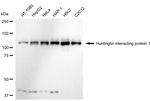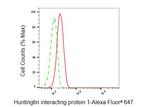Search Thermo Fisher Scientific
FIGURE: 1 / 2
HIP1 Antibody (MA5-52972) in WB


Product Details
MA5-52972
Species Reactivity
Host/Isotype
Expression System
Class
Type
Clone
Immunogen
Conjugate
Form
Purification
Storage buffer
Contains
Storage conditions
Shipping conditions
Target Information
Huntingtin disease, a neurodegenerate disease, is caused by the expansion of a polymorphic glutamine tract in huntingtin. The Huntingtin Interacting Protein 1 (HIP-1) is a reportedly proapoptotic, cargo-specific adaptor protein that may be involved in the pathogenesis of Huntingtin disease. As well as playing a role in Huntingtin disease, it is likely to be involved in the recruitment of clathrin coats to lipid membranes and it may also factor in tumorigenesis by allowing the survival of precancerous and cancerous cells. Since HIP-1 expression is significantly associated with prostate and colon cancer metastasis, HIP-1 can serve as a putative prognostic factor for prostate and colon cancers.
For Research Use Only. Not for use in diagnostic procedures. Not for resale without express authorization.
References (0)
Bioinformatics
Protein Aliases: HIP I; HIP-1; HIP-I; hip1; Huntingtin-interacting protein 1; Huntingtin-interacting protein I
Gene Aliases: 2610109B09Rik; A930014B11Rik; E130315I21Rik; HIP-I; HIP1; ILWEQ; Kiaa4113; mKIAA4113; SHON; SHONbeta; SHONgamma
UniProt ID: (Human) O00291, (Mouse) Q8VD75
Entrez Gene ID: (Human) 3092, (Rat) 192154, (Mouse) 215114

Performance Guarantee
If an Invitrogen™ antibody doesn't perform as described on our website or datasheet,we'll replace the product at no cost to you, or provide you with a credit for a future purchase.*
Learn more
We're here to help
Get expert recommendations for common problems or connect directly with an on staff expert for technical assistance related to applications, equipment and general product use.
Contact tech support
